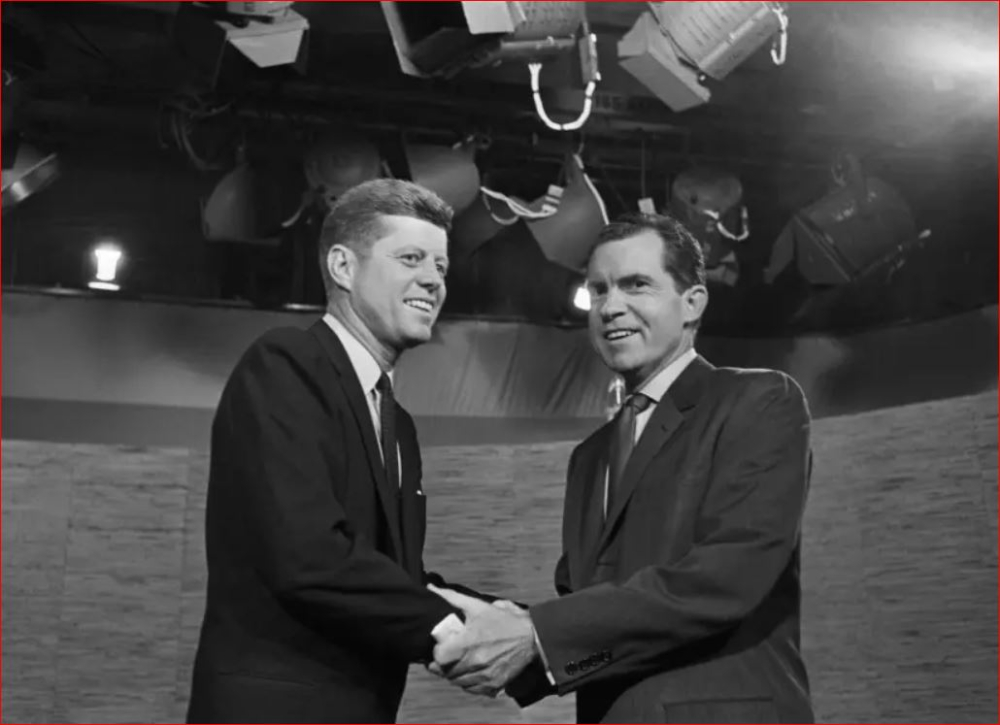US Presidential Election: Results Changed by Debate Between Candidates

We use Google Cloud Translation Services. Google requires we provide the following disclaimer relating to use of this service:
This service may contain translations powered by Google. Google disclaims all warranties related to the translations, expressed or implied, including any warranties of accuracy, reliability, and any implied warranties of merchantability, fitness for a particular purpose, and noninfringement.

Highlights
- Debates between presidential candidates are watched by a large number of voters on television and some make decisions based on that, so debates are viewed with great importance, especially to influence voters in swing states.



Donald Trump and Kamala Harris are the main contenders in the US presidential election on November 5. As the election date approaches, the first election debate between Republican Party candidate and former President Trump and Democratic Party candidate and Vice President Kamala Harris has started on Wednesday at 7:30 a.m. Nepali time.

There will be a 90-minute long debate between the two candidates at the National Constitution Center in Philadelphia, Pennsylvania. The debate, which will be televised by ABC, will be streamed live on ABC News Live, Disney Plus and Hulu. David Muir of ABC Television's news programs 'World News Tonight' and Lynsey Davis, the presenter of 'Prime', will moderate the debate.
According to American time, although the debate on Tuesday evening is the second round, Trump and Harris will meet face to face for the first time. The first phase of the debate was between President Joe Biden and Trump. But after Biden withdrew from the election race on July 21, Harris became the candidate of the Democratic Party.
The debate between the two candidates will focus on the country's economy, immigration policy, border security, abortion rights, international relations and foreign policy, gun laws, health care, climate change, and more. In the debate, each candidate will be given two minutes to answer the moderator's questions and the same amount of time will be given to refute the competitor's statement. During the debate, the microphone of the candidate other than the one who is speaking is turned off. Harris offered to keep the microphone open for the duration of the debate, but later agreed to keep it off. The new rule was introduced four years ago due to interference during the first debate between Biden and Trump in 2020. The debate between the presidential candidates is viewed with great importance as a large number of voters watch it on television and the voters decide to vote based on that. Such debates are especially effective in influencing the swing voters of the battleground states.
US presidential debates were first televised in 1960. Especially the debates between the candidates of the US presidential election were organized even before that. But only after such debates are televised, the candidates get an opportunity to reach a large number of voters and make their election agenda clear. Since then, televised debates between the major candidates have been an integral part of presidential elections. But some of these debates in the last 64 years are still in discussion.
Richard Nixon and John F. Kennedy (1960)
John F. Kennedy, who became a candidate from the Democratic Party, had an election debate with Richard Nixon of the Republican Party on September 26, 1960. It was the first televised US presidential debate. The debate between Kennedy and Nixon established the saying that 'presence matters in politics'. Kennedy, a young senator from Massachusetts, used the debate to make Vice President Nixon appear too weak in front of him. After the debate, the saying that 'Nixon is certain to lose the election' became famous. That was because Nixon looked old and tired during the debates. While wearing make-up, Kennedy looked young and attractive.
 Therefore, those watching the debate on TV believed that Kennedy would defeat Nixon by a landslide. But those who heard the debate between them on the radio thought that Nixon was the better candidate than Kennedy. Frank Stanton, president of the debate broadcasting company CBS, said, "Kennedy was elegantly dressed." But Nixon always looked dead.'
Therefore, those watching the debate on TV believed that Kennedy would defeat Nixon by a landslide. But those who heard the debate between them on the radio thought that Nixon was the better candidate than Kennedy. Frank Stanton, president of the debate broadcasting company CBS, said, "Kennedy was elegantly dressed." But Nixon always looked dead.'
Kennedy was not well known in American politics until then, but Nixon, who was the vice president, was more experienced and familiar in national politics. Kennedy's performance in those debates was outstanding. The next three debates were considered to have a major impact on the election results.
Jimmy Carter and Gerard Ford (1976)
After the Nixon-Kennedy debate, there have been no election debates in American politics for some time. In 1976, President Gerard Ford proposed a debate with then-Governor of Georgia and Democratic Party nominee Jimmy Carter. Ford became president after Richard Nixon resigned from the presidency in 1974 due to the 'Watergate scandal'. He was not very popular with the people. Carter's situation was similar. During the
debate, Ford said that "Eastern Europe has no Soviet hegemony and will never be subject to a Ford administration." After that, New York Times moderator Max Frankel raised questions about it. It is said that the election results were changed due to the same expression of President Ford. In the election, Carter of the Democratic Party won by a narrow margin. Following Ford's performance in the
debate, several media outlets published stories claiming Ford was "not ready for the job." Voters fleeing communist rule in Europe rose against Ford because of Ford's rhetoric. But analysts say the polls don't confirm that Ford lost because of that statement. The election results were determined by the results of the state of Ohio. It is said that the vote of Catholic immigrants from Eastern Europe in that state was decisive. In Ohio, Carter defeated Ford by 11,000 votes. That is less than 0.3 percent of Khas's 4 million votes at the time. Carter easily beat Ford in the popular vote.
Jimmy Carter and Ronald Reagan (1980)
For most of the 1980 US presidential campaign, Jimmy Carter was reluctant to debate Ronald Reagan. Carter underestimated Reagan, the former governor of California who gained popularity through the movie world. But about 10 days before the election, Carter changed his mind and prepared for the debate. At the time, Carter felt he was falling behind in the race and was gearing up for the bus to woo undecided voters. During the
debate, when Carter made his statement with facts and policy, Reagan countered with, 'Are you better off than you were four years ago?' and 'Would you go there again?' According to analysts, Reagan understood the fundamentals of the debate, but Carter, who appeared out of bounds, failed to convince the public. Ross Perot's (1992)
was unlike any other election in 1992. The debate was conducted in a relaxed 'town hall' format, as suggested by Bill Clinton's campaign . Bush's opponent, Clinton, presented his image as a friendly, suitable and more relevant candidate. In the debate, voters liked him more than his opponents. During the
debate, a Richmond voter asked a question about the national debt. But then President Bush was caught on camera checking the time on his watch. It was interpreted as President Bush being inactive or lazy. In such debates, every gesture, gesture or choice of words is considered very important, so it is said that it affected Bush. Ross Perot of the 'Reform Party' also participated in the debate. He is the third most successful candidate in US presidential election history. In the 1992 elections, he got 18.9 percent of the votes. . In post-vote polls, he lost the same number of votes as Clinton and Bush. But in the elections after four years, he got only 8.4 percent of votes.
George W. Bush and Al Gore (2000)
The highly contested 2000 presidential election debates decided by the Supreme Court were crucial. Before the election debate, Vice President Al Gore was strong, while Texas Governor Bush was weak. But when the debate broke out, Gore's position changed. He was very aggressive during the debate and people didn't like his style or behavior.
Gore was caught on a microphone sighing loudly as Bush was answering in the first round of the debate. Likewise, he was seen rolling his eyes, shaking his head in frustration. During the third round of debates, Gore approached Bush while he was speaking with the intention of cursing or cursing him. But Bush seemed unconvinced. He smiled and moved on, prompting laughter from the audience. George W. Bush, the eldest son of former President George HW Bush, lost the popular vote to Vice President Gore. But he got only one vote more than the 272 electoral votes needed to be elected as president.
Donald Trump and Joe Biden (2024)
The debate on June 27 during the US presidential election is viewed differently. Because of that, the debate ended US President Joe Biden's political career. That too tragically.
The June 27 debate is also described as the most 'embarrassing' debate. The debate at CNN Studios in Atlanta, USA, lasted 90 minutes. Biden spoke for 35 minutes and 7 seconds.
After the debate facilitated by Jake Tapper and Dana Bass, US President Joe Biden suddenly came into the limelight. The reason for that is his presentation. He was heavily criticized by the American media and the Democratic Party, while most American voters questioned Biden's age and ability to do the job. The Democrats were the ones who strongly criticized Biden saying that the presentation was too thin. After the
debate, Netflix co-founder Reed Hastings wrote in The Economist in an article titled "Why Biden Must Withdraw," "It was painful to watch an old man struggling to remember words and facts." In the debate, the 81-year-old Biden's voice was weak and his answers were incomprehensible. In addition, the answers he gave were not focused on the subject matter.
Likewise, New York Times columnist Nicholas Kristof wrote an article titled "President Biden, I've Seen Enough" and noted that "Biden is optimistic about withdrawing from the presidential race." In the article, he stated that the Democratic Party should put forward a new candidate to prevent Donald Trump from being re-elected and that Biden should open the way for that.
Prior to that, questions had been raised about Biden's mental and physical ability to hold the office of president until the age of 86. A few days after the debate, Joe Biden announced that he was withdrawing from the race on July 21, facing intense pressure from within his own party to abandon the candidacy. The result of the debate that separates Biden from the presidential race will be seen in the upcoming November presidential election.
(with help from agencies)
 प्रकाशित : भाद्र २६, २०८१ ०६:५३
प्रकाशित : भाद्र २६, २०८१ ०६:५३

 ३०.१२°C काठमाडौं
३०.१२°C काठमाडौं














